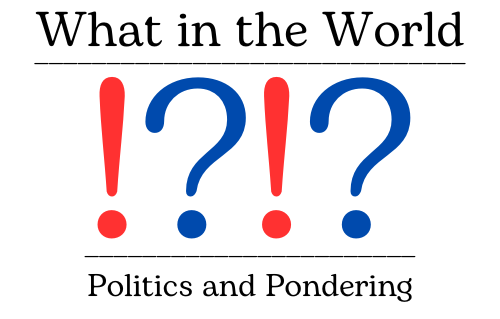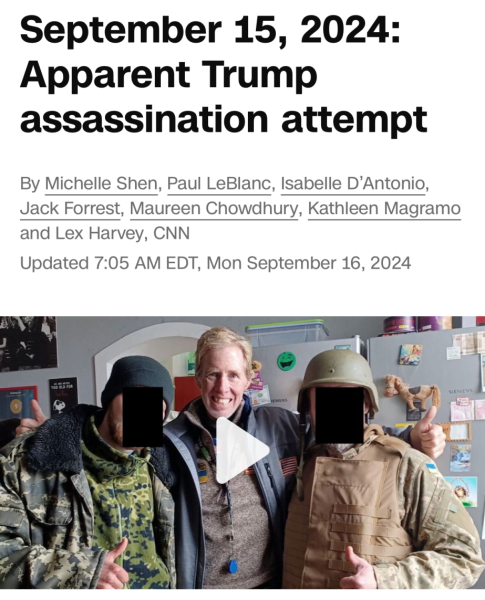
“What in the World” is a bi-weekly column where I go over world events and connect them to one overarching theme, so that I may ramble on about what I think people should learn from current events while also educating people on what’s going on in the world.
My goal here is to tell you “what in the world,” by letting you know the facts: what’s happening. Then, also to answer your question, “what in the world?” by giving you insight as to how human nature led us to such events, and how they should be received.
The theme for this first edition is hate. We are going to be looking at some of the ways hate spreads and how it is perpetuated throughout society. Not one person can be blamed for the perpetuation of hate, because every person, not as a citizen or a voter, but as a member of a community, as a family member or friend, has a responsibility to recognize what kind of media and rhetoric they are consuming, or even defending. The nation seems to divide more and more every day, but I’m here to say that the average citizen is not helpless to that division.

For the first case, I’d like to talk about the assassination attempts on Donald Trump and how hate both led to and arose from the situation.
Many of my peers have remarked that the situation feels dystopian, that they thought we had grown past this level or violence and brutish expression. The fact that we have people in our country attempting to assassinate nominees for elected office seems asinine to many young people. What we have to blame for these extremists is severe rhetoric and the spread of hate throughout our country. There are extremists who blame and make threats on both sides of the political spectrum. We need to be a country that can have two parties that disagree on policy but still respect each other’s lives.
Both attempted assassins were people who had been affected by generalizations and the media. As we can see from assassinations and assassination attempts in the past, public figures are chosen by the perpetrators as victims because of an extreme disagreement in beliefs coupled with the belief that the world would genuinely be a better place had the victim not been in it. So, had the ideology and claims surrounding Donald Trump not painted him so extremely as a villain, his life never would’ve been in danger. Regardless of the role mental illness could have possibly played in either assassination attempt, the would-be assassins likely would never have thought of taking his life had they not believed claims made by the media and people around them exaggerating his detrimental effect to not only America, but the world.
Similarly, the response to the attacks has inflated hatred surrounding politics even more. After each attempt, social media outlets were immediately flooded with speculation by Trump supporters of who the perpetrator was, and how their beliefs made them commit a violent crime. Then, I saw these connections being made, saying that since the offender must have disagreed with Trump, they must have been a democrat, and therefore, democrats are angry, and selfish, and can’t be trusted. Obviously, as we’ve just learned, spewing these kinds of hateful claims towards entire groups of people is dangerous. Instead of drawing the conclusion to be that the democrats are at fault, they should have drawn the conclusion that debates like the very one they were inciting were at fault. Their outspoken tweets, their hate-filled claims, and their generalizing about groups of people were no different than the ones made by democrats toward republicans, and are most likely the same kinds of claims that inspired the attempted assassins in the first place.

A second example of hate being used maliciously to sway voters is found in the rumors Donald Trump and his running mate J.D. Vance have been perpetuating about the Haitian immigrants in Springfield, Ohio.
The reason these politicians are singling out this community is not out of concern for pet-owners there, but because they know they can use the fear and anger of the American people as it pertains to this case to then back up their policies, specifically ones concerning the southern border and the mass deportations that Donald Trump has stated that he wishes to carry out. Let it be known that, no, nobody is eating dogs or cats in Springfield. In fact, the woman who made the original claim has visited news channels like NBC to publicly apologize, stating that she “misstated her story,” basically admitting that it was false.
Following the spread of false claims by both Donald Trump and his running mate J.D. Vance, a series of things have happened. First of all, there have been school closures due to bomb threats. Secondly, Haitian immigrants living in the area are rightfully fearful, as they have people threatening them from baseless claims. The usage of claims during the debate then continued to be circulated on social media have grown into blatantly racist propaganda, defaming an entire group of people as evil. People who support Donald Trump’s policies have a responsibility to denounce his remarks made about Haitians in order to bridge the gap between political parties. Adversely, the people who share photos like the ones Ted Cruz and other republicans have, make the political divide greater by spreading hate.

The third and final example of hate polarizing political parties in the U.S. is the monetization and profiting off of the upcoming election.
As it draws nearer, the manners with which public figures use to describe either presidential candidate grow more and more extreme, leading to further polarization of our nation. For example, two recent videos from the Jubilee YouTube channel, titled “Can 25 Liberal College Students Outsmart 1 Conservative?” and “Can 1 Woke Teen Survive 20 Trump Supporters?” have gained a combined 25 million views and sparked lots of conversation surrounding the election.
Both videos, which feature attention-grabbing thumbnails and intense introductions, focus on the presidential election and reasons why one candidate is better than the other. The aftermath of these videos was, unfortunately, more disagreements. We live in an age of monetization and sensationalism, where what’s valued is not the truth, or coming to an understanding, but rather being outrageous and making bold, rage-inducing claims in order to attract more people to watch content so that YouTube channels like Jubilee can profit off of the interaction it gets. Our duty as consumers is to recognize when the claims that people and corporations are making are exclamatory or untruthful.
People form their opinions of entire groups of people based on their own personal experiences.
It is imperative that in order to stop the perpetuation of polarization, we ensure positive experiences with those who disagree with us. When two people interact negatively, they are both likely to remember and internalize that interaction and use it to make decisions about the type of person they had the interaction with in the future.
An example of this would be if I had an argument with someone with 11 toes, and they insulted me. In the future, I might be likely to avoid conversations with people who have 11 toes. The person who has 11 toes, therefore, may feel slighted due to my aversion to everyone like them, and may, in turn, decide that everyone who only has 10 toes, like me, are all rude and make hasty assumptions. As one can see, nobody emerged from this situation happy, and now there has been a rift caused between the 10-toed and 11-toed communities. While this may seem like a lesson in respect that is obvious enough to be taught to small children, substituting the difference in quantity of toes for a difference in political ideologies makes this silly metaphor not only relevant, but apparently, more difficult to navigate for many adults. The most important thing to remember when engaging with someone, whether it be online or face to face, is to consider how you would feel in their position. Sure enough, we can rely on basic human understanding and compassion to navigate through our indignation and find a solution to our mutual problems. By recognizing and discouraging inflammatory remarks made by anyone, regardless of who they are made by and who they are made towards, each person can help minimize the polarization in this country.
Editor’s Note: The ideas and claims shared in this article are the opinions of the writer. These views may not represent those of the adviser; of the Trail staff as a whole; of the Trail’s advertisers; of the administration, faculty or staff of McIntosh High School; of Fayette County Public Schools or of the FCBOE School Board members.


